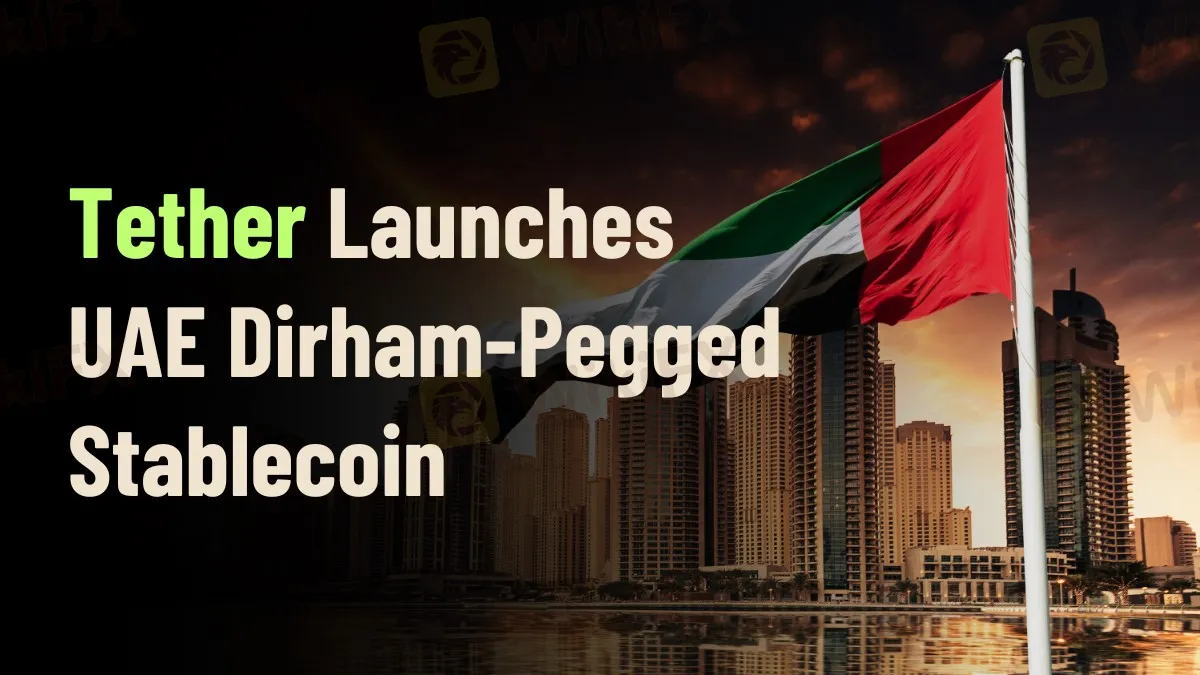Abstract:Tether launches a UAE Dirham-pegged stablecoin, AEDT, in partnership with Phoenix Group, providing stable digital transactions and enhancing the UAE's digital economy.

Tether, the world's biggest stablecoin issuer, has announced the introduction of a new stablecoin pegged to the United Arab Emirates Dirham (AED), marking a significant milestone in the digital asset market. This new digital asset, known as AEDT, is expected to broaden the scope of stablecoins by serving as a digital replica of the UAE's national currency, backed by local liquid reserves. Tether's entry into the UAE market demonstrates the region's rising importance in the cryptocurrency and blockchain industry.

Tether Partners with Phoenix Group and Green Acorn Investments
This new stablecoin is the product of a strategic cooperation between Tether, Phoenix Group PLC, the UAE's top IT company, and Green Acorn Investments Limited. Phoenix Group, well-known for its technological and financial innovation, has partnered with Tether to promote AEDT as a prominent participant in the digital economy. Green Acorn Investments also provides assistance in ensuring that the project is compliant with the UAE's regulatory framework and economic goals.
The introduction of AEDT represents a major milestone in Tether's product portfolio, which currently comprises a varied variety of stablecoins such as USDt (pegged to the US Dollar), EURT (Euro), CNHT (Chinese Yuan), MXNT (Mexican Peso), XAUT (Gold-Backed), and aUSDT (Australian Dollar). This latest acquisition demonstrates Tether's dedication to broadening its reach and offering reliable digital currencies in major worldwide regions.
Tether Ensures Stability in UAE's Expanding Digital Market
Tether's Dirham-pegged stablecoin will follow the greatest levels of transparency and security. Each AEDT token will be completely backed by UAE liquid reserves, guaranteeing that its value stays steady and directly related to the Dirham. This adherence to Tether's strict reserve criteria is intended to inspire trust in both users and investors, making AEDT a dependable option for digital transactions in the UAE.

Tether CEO Paolo Ardoino stated his delight about the upcoming launch. “The United Arab Emirates is swiftly rising as a worldwide economic powerhouse, and we are thrilled to provide our users with a stablecoin tied to the Dirham. This project not only adds to our current stablecoin offering but also reflects the region's rising need for safe, efficient digital currencies.”
The launch of AEDT is believed to be essential to the UAE's financial environment. Tether's new stablecoin will simplify international commerce, improve remittance systems, and assist companies in lowering transaction costs by providing a simple and cost-effective way to use the Dirham. AEDT also serves as a currency hedge, contributing to the UAE's expanding worldwide financial power.
UAE Rises as Global Hub for Cryptocurrency Innovation
The formation of the Virtual Asset Regulatory Authority (VARA) has aided the UAE's quick rise to the forefront of the cryptocurrency market. VARA, the world's first independent crypto regulator, has established a favorable regulatory climate in places such as Dubai and Abu Dhabi, enabling considerable development in cryptocurrency use since 2022.
The UAE's innovative approach to digital assets and blockchain technology has drawn global businesses and entrepreneurs to the area. This legislative clarity has converted Dubai and Abu Dhabi into significant crypto and blockchain centers, providing a welcoming climate for new ventures like Tether's Dirham-pegged stablecoin.
Seyedmohammad Alizadehfard, Phoenix Group's Co-Founder and Group CEO, emphasized the significance of this new breakthrough. “We are excited to work with Tether to bring AEDT to market. The UAE's forward-thinking attitude to blockchain and digital assets, paired with the Dirham's stability, provides an ideal basis for this innovative endeavor. We think that our partnership will change the digital economy for people in the area and beyond.”
Future Implications of Stablecoins on the UAE Economy
The worldwide stablecoin market is presently worth $150 billion, with Tether's USDt commanding a market size of more than $115 billion. According to projections, the stablecoin business will be worth $2.8 trillion by 2028, and AEDT's entry into the market might greatly contribute to that expansion.

Tether's entry into the UAE represents a larger trend of global digitization and the growing relevance of stablecoins in the current financial environment. As the need for safe, efficient digital transactions grows, AEDT will play an important role in allowing cross-border payments, commerce, and financial diversification in the UAE and beyond.
Tether's Dirham-pegged stablecoin provides a new way for companies and people to conduct financial transactions. Whether for trading, remittances, or just diversifying digital assets, AEDT is a great tool for people wishing to connect with the UAE's vibrant and rapidly growing digital economy.
As Tether and its partners prepare to launch AEDT, the UAE is positioning itself as a worldwide leader in cryptocurrency innovation, setting the path for a future in which digital assets are an integral component of daily financial activities.













